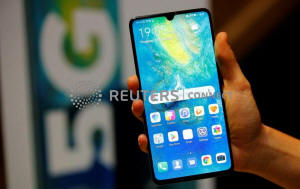Huawei shows off 'most powerful' chipset as forges ahead with 5G
smartphone plan
 Send a link to a friend
Send a link to a friend
 [September 06, 2019] By
Douglas Busvine [September 06, 2019] By
Douglas Busvine
BERLIN (Reuters) - Huawei Technologies
showcased its chipset for a new high-end smartphone on Friday, pressing
ahead with plans to launch its Mate 30 range, despite uncertainty about
whether the new phones will be able to run Google's Android operating
system and apps.
The Chinese tech giant bills the Kirin 990 chipset as the first
all-in-one 5G system on a chip, describing it as superior to
alternatives from Qualcomm <QCOM.O> and Samsung <005930.KS> that, it
says, graft 5G modems on to 4G chips.
"It’s the world’s most powerful 5G system on a chip. It’s the world’s
most powerful 5G modem," Richard Yu, the head of Huawei’s consumer
business group, said in a speech in Berlin.
Huawei's launch at the IFA consumer electronics fair in Berlin of the
Kirin 990, made using the latest 7 nanometer production process, is part
of a carefully sequenced buildup to the Sept. 19 international launch of
the Mate 30 in Munich.

Yet, say Huawei sources, it is still not known whether the Mate 30 will
be able to run services from Alphabet's Google <GOOGL.O> following the
blacklisting of the Chinese company by the U.S. administration in May.
That ban sliced 5 percentage points off Huawei's market share in Europe.
The world's No.2 smartphone maker is looking to reclaim ground as the
spread of ultra-fast 5G networks prompts an upgrade cycle among
consumers who have been holding on to phones for longer. Consumers will
need new handsets to take advantage of the ultrafast download speeds
promised by 5G.
NO GOOGLE, NO JOY
The services in doubt include pre-installing the Google Play store and a
suite of popular apps such as Google Maps that buyers would expect to be
available from the moment they turn on their new phone and synch it with
their profile.
Huawei's fallback option would be to run the devices on its home-grown
Harmony operating system, although company officials and analysts say it
is not yet ready for prime time.
[to top of second column] |

Huawei Mate 20 X
(5G) is pictured at the IFA consumer tech fair in Berlin, Germany,
September 5, 2019. REUTERS/Hannibal Hanschke/File Photo

"The elephant in the room is Google," said Peter Richardson of Counterpoint
Research, after attending a technical briefing on the Kirin 990 by Huawei
managers that skirted the issue and focused only on the chipset's
specifications.
The Kirin 990 packs more than 10 billion transistors and can support downlink
speeds of up to 2.3 gigabits per second.
It has an adaptive receiver that enables it to switch between 4G and 5G where
coverage of the faster technology is weak.
And, to save energy, it has a 'big core' to handle powerful computing tasks with
the support of artificial intelligence, and a 'tiny core' for less demanding
operation.
Huawei plans only to use the Kirin 990 in its own devices, meaning it lacks the
marketing opportunities enjoyed by Qualcomm, whose chips already power the
Samsung 5G phones, such as the Galaxy 10, already on the market.
Apple's recent settlement of a patent dispute with Qualcomm, and Intel's <INTC.O>
exit from the smartphone modem business also reflect the U.S. chipmaker's muscle
in a global market that is increasingly fragmenting due to the U.S.-China trade
tension.
"Qualcomm has a scale advantage," said Ben Wood, analyst at CCS Insight. "Huawei's
commitment to continue innovating on silicon is really impressive, especially
given the geopolitical headwinds they are facing.
"But at the end of the day, it's a single-vendor solution. And, even if they had
aspirations to sell the chipset, that is getting more difficult all the time."
(Reporting by Douglas Busvine; Editing by Keith Weir and Alexander Smith)
[© 2019 Thomson Reuters. All rights
reserved.] Copyright 2019 Reuters. All rights reserved. This material may not be published,
broadcast, rewritten or redistributed.
Thompson Reuters is solely responsible for this content.
 |